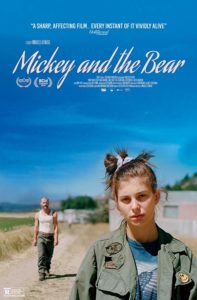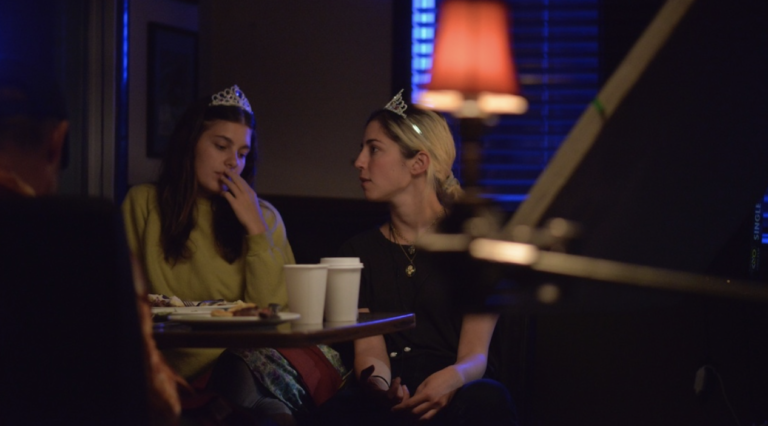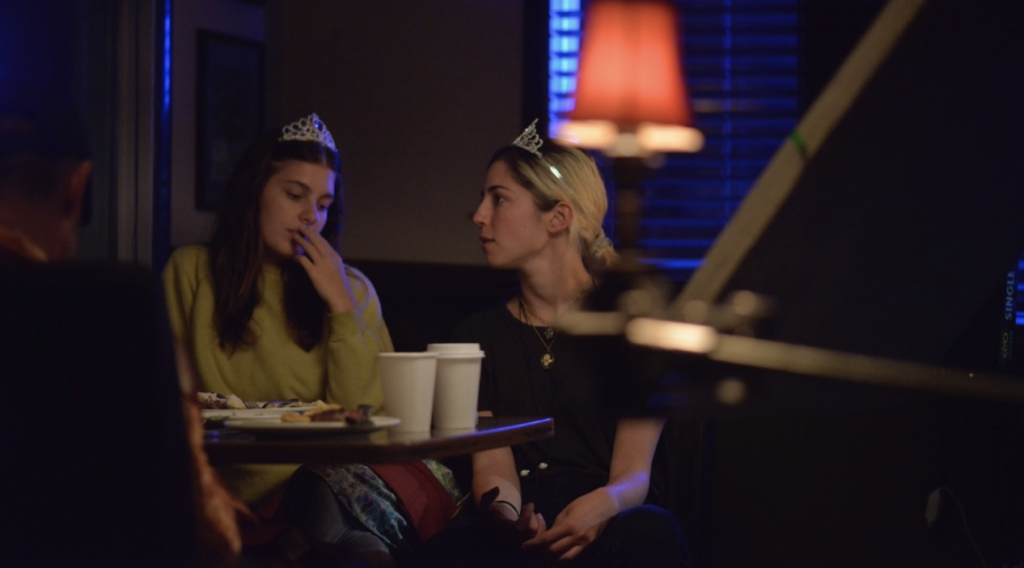

“Annabelle Attanasio is a writer and director based in Brooklyn. Her first feature, MICKEY AND THE BEAR, had a critically acclaimed premiere at SXSW where it was described as ‘a sharp, affecting film that’s brimming with darkness and hope, every instant of it vividly alive,’ by The Hollywood Reporter, and named one of Variety’s Best Movies of SXSW. The Washington Post called the film ‘one of the most exciting breakout films of the year’, and RogerEbert.com sang the movie’s praises, calling it ‘an almost perfectly realized drama that feels as if it was time-warped in from 40 or 50 years ago, in the tradition of great American cinema chamber pieces like ‘The Last Picture Show,’ ‘Alice Doesn’t Live Here Anymore,’ ‘The Great Santini,’ and more recently, ‘Winter’s Bone.’’ It went on to make its international premiere at the Cannes Film Festival as a part of the Acid Official Selection and later played in competition at the Deauville American Film Festival, where it was distinguished by The New York Times as one of the standout films directed by a female filmmaker. It holds an 100% Fresh rating on Rotten Tomatoes.”
“Set in the hard-scrabble mining community of Anaconda, Montana, Camila Morrone stars as a teenager who is her father’s caretaker, OxyContin supplier, and bail-provider; her father, played by James Badge Dale, is a PTSD-afflicted Iraq War vet whose erratic personality betrays flashes of the charm that was once his meal ticket.” – Film Forum
On January 24th 2020, NOIAFT founder, Taylor Taglianetti, spoke with Annabelle Attanasio about her debut feature, Mickey and the Bear.
Taglianetti: I’m so happy to speak with you because when I saw your film a couple of months ago, I was totally floored by it!
Attanasio: Oh, thank you!
Taglianetti: It’s one of those films that you look back on in a few years from now and you just say, “Wow, that’s where they all started.” I reached out to your distributor and I saw one of my former professors was thanked in the credits and I said, “Oh my God, I feel like I’m in on this little secret because it’s such a good film and it got such incredible reviews. The film has a 100% rating on Rotten Tomatoes. I just loved it and for a first time director, it’s such an incredible film.
Attanasio: Thank you so much. I really appreciate that.
Taglianetti: What I really like about the film is the way that one of our NOIAFT members, Giò Crisafulli, describes it; he sees it as, really, a story of survival and responsibility in a small town. How much responsibility does one have to change their circumstances and to take care of others? So, did you feel any sort of responsibility in telling the story?
Attanasio: Part of me did feel this responsibility. I had experienced a completely different iteration of this sort of co-dependency within a family and I didn’t have any sort of medium or platform to discuss it with others. It felt like something that only I, when I was growing up, only I, was sort of grappling with those things.
I sort of felt like I didn’t have the language to talk about it – these sorts of dynamics in the family. But as I got older and, particularly when I started spending more time in Montana, and talking to people who were closer to Mickey’s age, I realized that this is, you know, the kind of…the tight bond and, at times, co-dependent link between parent and child that is pretty common and, not only with teenagers, but also with grown ups so I did feel in some sense that this, while a more intimate story, it was a story that I wanted to put out into the world because I knew had I had a movie like this when I was younger, it might have helped me to have more of an understanding and language to talk about the things I was going through.
Taglianetti: Well, what’s interesting about the film is that, you know… I see it as not one that really calls attention to itself. It’s very understated; it’s not a film where, again, my colleague Giò describes…there’s not really necessarily a ticking clock where there’s something tangible to be achieved or attained. It’s really everyone’s happiness that’s at stake. So, when you know you’re writing this and directing this, what’s your thought process? Is it the story first, or the characters first? Because, I mean, it almost feels like a play to me…the way that it’s written. And, I read that you have a great love of theatre, so what comes first when you’re writing?
Attanasio: The first thing I would say is actually the location which is sort of a theatrical instinct because I do like to write to a location and sort of one location even if not the entire movie takes place there. I love thinking of how things work within a space, especially this type of space. So, the mobile homes that they live in is the first thing that came to my mind. What would happen within a family who lives in these really tight quarters? Then, after that I would say, the next thing is thinking about the characters and what they want and where they come from and all these things. And then after all of that is sorted out, it becomes more about what the story is and, why, why now, and why this moment in these people’s lives? But, I think for me, especially when writing just for myself, stories that I just want to tell, it’s so crucial to have characters that you want to hang out with and spend time with every day. Because for me, at least, that’s the thing that makes it fun and makes it challenging and exciting is, you know, writing for three or four or five people.
Taglianetti: And you had brought up in a couple of other interviews that Eighth Grade and Leave No Trace…they are these father-daughter stories that we’re seeing more and more. I think you approached this father-daughter story pretty tenderly. You may not agree with what a character’s doing, but you understand why they’re doing that, and why they’re feeling that way. So, what were the other inspirations you looked to besides those movies?
Attanasio: I didn’t even really look for those movies per se, because they were so similar in terms of just the dynamic that I was just so happy that movies like that with that father-daughter dynamic exist in the world today; it’s just something you don’t normally see, particularly from the daughter’s perspective. But, in terms of references, I always say Paper Moon. I remember I saw Paper Moon when I was pretty young…I think eleven or something and, it just really stuck with me. Because they never really…it takes them so long to really acknowledge what their relationship is or, particularly, for the father to acknowledge his relationship to his daughter. And while it’s an incredibly funny, light-hearted film, at times, it’s also dealing with really serious subject matter and I always look to Paper Moon as my holy grail in a lot of ways. While my movie stylistically is different, I took a lot of inspiration from that. And, I was also really influenced by William Eggleston photographs; that was a big part of my vision for the film. While its modern day, how can I recreate this sort of timeless and effortless Americana that Eggleston so beautifully perpetuated in his images?
Taglianetti: Since this is your feature debut and I know you said that you’ve never taken a film class before…but you are an actress, so were you approaching Mickey and the Bear as an actress becoming a director or as a cinephile becoming a director? How do you go in with that confidence?
Attanasio: Well, I’ve been thinking about the film for so many years and, I think that thinking of yourself as an actor or not having the ability or the training to make a movie is just like a way to not do it. I actually think actors are some of the most intelligent creators in terms of the…or the most intelligent artists, in terms of story, because actors really have to make the story work if you’re really actually a good actor. So… I don’t know… I think I approached the storytelling from an angle of loving the story, and loving the process, thinking about every angle, and then, I also had a tremendous amount of support from various people that I had met as an actor: directors, writers, teachers. So, I felt like my support net, by the time I thought to make the film, was quite strong. Where I knew…I knew who to call when I had a question. And I knew very much that I couldn’t have done it without having a support net.
Taglianetti: And well you have experience in short filmmaking, too, so I’m sure that was an exciting turn as well. I love your short film, Frankie Keeps Talking and I have to bring it up, too, because this is an Italian outlet, ha! I like what you did there, but that film is very unique and fun and quite different from Mickey And The Bear, in terms of pacing. But I do see in your work… a lot of it is about men not understanding women. Would you say that is a throughline in your work?
Attanasio: [Chuckles]. Um… I think my work definitely has to do with gender roles and women figuring out how to break out of those boxes that have been prescribed to them from birth. But, in terms of the understanding, I also think within same sex relationships, there’s a lot of misunderstanding, too. So I would say, I always look at gender roles and gender in society as something way more systemic. Where like Mickey and Hank were born into this world, sort of with different privileges and different expectations and, for me, it’s more about when you’re given either advantages or disadvantages for any part of who you are, based on what the world is willing to give you… how then are you going to break out of that? How then are you going to basically dismantle and take down that construct? And, I don’t know, I think our world is so inherently patriarchal and that for me, it’s incredibly unavoidable to tell stories that incorporate patriarchal friction between differently gendered people.
Taglianetti: Do you find that as a challenge in financing the project or even distributing the project? I ask because of the marketing. In watching the trailer, it doesn’t give you a lot of the story, but I like that. You get just enough to want to see it. So, was that ever a challenge in approaching the themes from a financial or a distribution standpoint?
Attanasio: Um, yeah. I think… it definitely was a challenge in ways because I think the subject matter is incredibly scary for people because everyone in some point in their life has to go through some dynamic like this even if you don’t talk to your parents, or even if your parents are not in your life… there’s always going to be some sort of unresolved friction between that person and you. And, I think it’s a story, while I really wanted it to be heartwarming, I also wanted to make it uncomfortable for people, and those are always more challenging to get off the ground.
Taglianetti: The film is pretty short; it’s an hour and a half. So, what did you leave out? I’m so curious. How did you approach the editing process?
Attanasio: Well, I’m glad you said it’s short; that makes me happy. I guess 90 minutes, for me… I think of 90 minutes as the norm these days. Honestly, I guess, two and a half hours is where a lot of movies this year played. But, anyway. We cut a ton. I think, in the edit, it became increasingly centered on Mickey. Where is Mickey at, from moment to moment, and how do these scenes further the story? And, you would think that every movie would subscribe to that, but there are so many ways to deter from the path in films and in a beautiful way. But with this film, in particular, especially with it being my first feature, I really wanted it to feel economical and I didn’t want anything in there that felt superfluous at all as much as possible. Everything else, like more exposition about other characters, a less straightforward path for her, from beginning of the film to the end, all of the stuff that had contributed to those elements of the screenplay, got axed.
But, I love editing. It feels almost like doing a really good spring clean or like finishing a crossword, but so satisfying to figure out within the footage you got, which of course is never enough, you always want more, but within what you have, how can you most efficiently tell the story, while also keep the viewer intrigued and not being so economical that the story is boring, but also not being longwinded that you lose the momentum.
Taglianetti: I don’t think you wasted a minute. That’s what I really appreciated about it, too. It just kept going.
I was watching an interview with your producer, Lizzie, and she had said that you didn’t care as much about whether people liked the movie but more so if they reacted to it. So, have you been getting any reactions, especially now that your releasing in France and other parts of the world… has there been really different reactions than what you had been going for or what you had been anticipating?
Attanasio: Yeah, I mean the thing is…Lizzie and I were always cognizant of the fact that you can’t control what people are going to think. And even, you know, this movie is not incredibly controversial, at least to me, but still it was more so about within what it is saying about dynamics within the family, and fathers and their daughters, it wasn’t supposed to rub everyone the same way. So, for as many people who identified with either Hank or Mickey, there’s probably someone who really didn’t like the way it was portrayed and for me, someone saying, “This made me upset” or “I really didn’t like this” is, at times, just as good as someone saying they loved it.
Taglianetti: That’s a great way to put it.
Attanasio: Yeah! At the end of the day, I think it’s like when you go to a museum. If you feel disgusted by an image, that’s better than feeling nothing. That’s why you participate in being and interacting with art because you want to be challenged. In France, particularly, I think there is more of an embracing of this sort of challenging, less straightforward relationship, perhaps because of the culture. In France, it was funny…we always got the question, did she kill him in the end? Only there. It’s interesting that this question only came up in this one country. And that there’s this kind of darker possibility, embracing of the fact these relationships do exist in much worse ways than even in the film, or much harder ways, than film. I felt very happy that we were able to play a couple of times in France. Now, we’re being released in France. I wouldn’t have guessed it, but now I think, in retrospect, that it does make some sense.
Taglianetti: It has a bit of a European feel to it, I would say.
Attanasio: Oh, cool.
Taglianetti: Right. I like it. It’s not the IP driven stuff that we’re craving here, but in Europe, it’s definitely something that I think they like. Relationship movies…they care a lot more about them than we care here. At least we only like them September to December, basically: Oscar season.
So, what’s next for the film and what’s next for you? Are you working on anything new?
Attanasio: Yes, I’m working on my next feature which I’m really excited about. In terms of the film, we’re being released in France now and in February on iTunes or Apple TV. Fingers crossed that we get to continue spanning and people get to continue seeing the film.
Taglianetti: Well, I’ve been telling everybody I know about it. I look forward to posting the interview and spreading the word. It’s really phenomenal and I can’t wait to see more of your work!
This interview has been edited and condensed for clarity.


Great interview, can’t wait to see the movie!